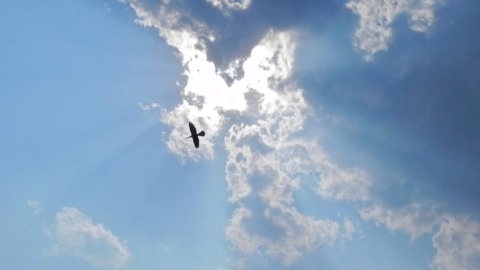Is there an intrinsic intent in the universe to evolve brains capable of conscious awareness of Mind? That’s a religious and philosophical question, not one that can be answered by science.
 Although if direct or indirect contact is made with intelligent life on other planets, then we’ll know whether sentient creatures possessing symbolic thought anywhere in the universe go through the same basic crisis, generated by thought’s fragmenting tendencies, that humankind presently is.
Although if direct or indirect contact is made with intelligent life on other planets, then we’ll know whether sentient creatures possessing symbolic thought anywhere in the universe go through the same basic crisis, generated by thought’s fragmenting tendencies, that humankind presently is.
On earth anyway, the evolution of higher thought both made awareness of the sacred possible, and is the greatest impediment to realization of humanity’s spiritual potential. That’s the great paradox of the human condition.
Higher thought gave man the ability to remove and name things, store vast amounts of information in memory from experience, and formulate knowledge. Its evolution is very recent by geological standards, since humans only acquired this overall capacity about 100,000 years ago.
The increase in gray matter and neural complexity gave the brain the capability of being fully conscious, but it also made man a prisoner of his symbols and memories, beliefs and traditions. That’s why humans have vastly increased knowledge and technology, but not grown in wisdom.
The human species is on the verge of fully replicating higher thought with computers, which means that the brain no longer needs to be the primary storehouse of memory. So can enough human beings awaken genuine intelligence beyond thought to breakthrough, releasing our capacity for insight?
Despite what we’re told and taught, the mind does not have to view life through its symbols and accretions, that is, through the glass darkly. But to see things as they actually are in the present, thought must be deeply quiet.
The unquestioned notion that we can only perceive through words and images, conditioning and culture, is simply false. Learning the art of methodless meditation is vitally important because it awakens the capacity in the human mind for direct perception and insight.
Many supposedly educated people believe that there is no such thing, and deride what they call ‘immaculate perception.’ But that just means they’ve never really looked at anything, even something as overwhelmingly beautiful as the Grand Canyon, which stuns the mind into stillness, at least for a few seconds.
Insight and intelligence lay beyond thought, not through it or in it. It’s the arrogance of thought that maintains that we cannot see anything except through the words, images and theories generated by the human mind.
The quieting of thought allows direct perception, which awakens the insight and intelligence of the universe in the individual.
So, returning to the basic philosophical question: Is there an intrinsic intent in evolution to evolve brains capable of awareness of the cosmic mind?
One feels so. That doesn’t make us the center of the universe, or mean the human brain is the ‘goal’ of evolution. There is no goal; there’s only the unfolding of a tremendous mystery that thought, knowledge and even science prevent us from seeing and feeling when they dominate the brain.
——————-
Despite many more people on a Sunday afternoon than when I’ve been here during the week, the mountain reservoir is still an amazingly quiet place.
Over a quarter mile away, some kids at a picnic site across the lake can’t handle the silence, and make incessant and weird noises. Just as they leave, a gaggle of garrulous adult cyclists stream in. One can hear their conversation from hundreds of meters away. After they disappear into the woods behind me, an eagle leisurely soars in over the water.
I watch as it hovers almost motionlessly for a few seconds. Suddenly, one of its wings points skyward, and it plunges to the water, breaking the surface. Laboriously lofting itself into the air, it holds a large fish in its talons! As if to show off its prize and prowess, it curves across the inlet and heads directly towards me. It holds a big trout perpendicular to its body, almost as long as the eagle itself.
Having attuned through passive watchfulness to the tangible silence of the place, the mind effortlessly falls silent. I hear a strange, zipping sound behind me. A few seconds later, a duck flies over at considerable height, literally sounding like it is unzipping the air.
A couple rides by on their bikes, not visible through the trees and brush. The young man’s voice incongruously echoes through the silence: “…he said you take a picture of your wife or whatever, and they can make you Legos for that. But he said it costs a lot of money.”
A small noiseless fishing boat, powered by an electric motor, trolls the calm waters, a taut fishing line trailing behind it. For a few seconds the beauty of the scene is overwhelming, as the sun illumines the water, the boat, the pines and the few deciduous trees along the shoreline.
The reactions of thought, which stem from memory, are so trivial that the entire mechanism simply shuts down. The silence of the place becomes so intense that it instantly engulfs every sound, natural or man-made, outer or inner.
Listening in that palpable silence, meditation, which is really a state of negation, takes awareness to ineffable depths. For a few timeless minutes, one contacts something beyond all knowing, the quintessence people have sought since time immemorial.
Martin LeFevre

